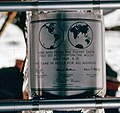Lunar Module Eagle
Lunar lander used for Apollo 11 From Wikipedia, the free encyclopedia
Lunar Module Eagle (LM-5) is the spacecraft that served as the crewed lunar lander of Apollo 11, which was the first mission to land humans on the Moon. It was named after the bald eagle, which was featured prominently on the mission insignia. It flew from Earth to lunar orbit on the command module Columbia, and then was flown to the Moon on July 20, 1969, by astronaut Neil Armstrong with navigational assistance from Buzz Aldrin. Eagle's landing created Tranquility Base, named by Armstrong and Aldrin and first announced upon the module's touchdown.
| Eagle | |
|---|---|
| Part of Apollo 11 | |
 | |
| Type | Lunar module |
| Class | Apollo Lunar Module |
| Manufacturer | Grumman |
| Specifications | |
| Launch mass | 33,294.5 lb (15,102.1 kg)[1] |
| History | |
| Deployed | July 20, 1969 |
| Fate |
|
The name of the craft gave rise to the phrase "The Eagle has landed", the words Armstrong said upon Eagle's touchdown.[2]
Flight
Eagle was launched with Command Module Columbia on July 16, 1969, atop a Saturn V launch vehicle from Launch Complex 39A, and entered Earth orbit 12 minutes later.
Eagle entered lunar orbit on July 19, 1969. On July 20, Neil Armstrong and Buzz Aldrin entered into the LM and separated it from Command Module Columbia.
Eagle was landed at 20:17:40 UTC on July 20, 1969, with 216 pounds (98 kg) of usable fuel remaining.
After the lunar surface operations, Armstrong and Aldrin returned to the Lunar Module Eagle on July 21, 1969.
At 17:54:00 UTC, they lifted off in Eagle's ascent stage to rejoin Michael Collins aboard Columbia in lunar orbit.
After the crew re-boarded Columbia, the Eagle was abandoned in lunar orbit. The location of its impact on the Moon's surface during an orbit decay is unknown, and there is evidence that Eagle may still be in orbit.[3][4]
Gallery
- Lunar Module Eagle prior to extraction from S-IVB stage on July 16, 1969
- Neil Armstrong and Buzz Aldrin land the Lunar Module Eagle on the Moon on July 20, 1969.
- The plaque left on the ladder of Eagle
- Apollo 11 50th Anniversary commemorative silver dollar depicting Eagle
- Image of Eagle by Michael Collins from Command Module Columbia
See also
Wikimedia Commons has media related to LM-5 Eagle.
Notes
References
Further reading
Wikiwand - on
Seamless Wikipedia browsing. On steroids.




